- Home
- Neil Gaiman
The Sandman: Book of Dreams Page 2
The Sandman: Book of Dreams Read online
Page 2
Inside the Pavilion of Recurrence today they are assembling for a dream of masquerade and high water. The bell calls them in, the figments, the chimeras, the larval entities that make up the crowd. A raven perches on a sill above the jetty, inspecting them as they disembark. Beneath their long hair they are faceless. Smoke drifts from their unfinished fingers. One carries a tambourine. Others seem to be swirls of paisley and embroidered clothes with no bodies inside them at all.
A foreground character with the likeness of a placid child speaks to the librarian, who is consulting the index of a large book. "How many more times must we do this?"
The librarian answers, "Until he ceases to mourn."
Her voice was harsh, roughened by smoke and bad habits. "What are you doing the rest of the weekend?"
"I've got some stuff to sort out. Some projections."
"Astral projections?" she asked, teasing.
"Just the regular kind. Sales and budgets."
"Shit, Ollie, they really got your feet nailed to the floor, don't they."
Oliver drank beer, licked his lips. "The work don't do itself, Sherri," he said. "It don't go away." He found himself saying things like that, don't instead of doesn't, when he talked to Sherri. It was more appropriate, somehow, out here where people wore beer brand T-shirts and drove around with their dogs beside them in the front seat.
"Sure it does," she said. "When it goes away, that's when you start to worry."
He asked her: "What are you doing these days, Sherri?"
"I'm going into solar," she said. "You know that little place down on the mall? They got a sales training program and incentive scheme and everything. You sell enough systems, they fit you one for free." She braced her arms on the rail and beamed up at the sky as though she could already see the big glass panels erected on her roof, gathering heat from the benevolent sun.
"That would be good," said Oliver.
Sherri never told you what she was doing, always what she was going to do. She never seemed to do anything, unless it was some crazy scheme, charting horoscopes, designing children's clothes, selling tofu sandwiches out of the back of a truck. House painting, she did sometimes. There was a house across the valley she told him she had painted. It had a huge yellow sunflower on the side.
Sherri always made Oliver think of California, twenty years before. Nearer thirty now. She reminded him of when he had lived that way himself for a time, on the coast, in the days of Donna. It had been possible then. In the summer it was a gas--had they really said that? Something was a gas? The phrase seemed strange to him, as if it could not possibly have ever fit inside his mouth. In the summertime, anyhow, yes, the living was easy: plenty of work, warm nights, they slept on the beach.
In the winter it was different. Then there was no work, it was freezing cold and it rained all the time. You had to hole up in the empty tourist cabins, try to live on what you'd saved from the summer. The two of them had joined a commune, a bunch of psychedelic musicians and their "old ladies"--Jesus Christ, had he said that too, and called them chicks and talked about freaking out and scoring dope? Living on rice and beans, sleeping in bags on drafty floors, keeping watch for the Russian River to flood. Jesus Christ, he must have been crazy.
Oliver thought about Donna then, almost without knowing he did so; and as he always did, blanked out her features before consigning her to oblivion.
He drank his beer.
The figments troop into a small room. The room has walls and a floor of green jade. No matter how many of the figments come in, the room is always big enough to hold them.
In the green jade room the Continuity Girl checks their manifestations for them. The Continuity Girl wears gold bangles shaped like stirrups and a reassuring jacket of russet tweed. She tries to call the roll. "Parqua... Quarpa... Apquar..." The letters on her clipboard wriggle about.
"Minimum May ... Dr. Scorpio Bongo ..." The figments are ignoring her. Background characters settle into clusters, comfortably. Absentmindedly they start to merge.
The raven perches on the librarian's shoulder. It speaks. "What's the story here?" it asks.
Patiently the librarian adjusts his glasses, dislodged by the raven's landing, and turns over a page. He follows the line of an entry with his finger. "It looks like a dream about lost love ..." he says.
"Yeah, well, typical," says the raven.
"... and about a river rising."
The raven nuzzles its purple plumage. "I think maybe I've seen it."
The clustered figures are growing consolidated, like statuary groups. Their fringes are entwining, the patches on their denims running together. The Continuity Girl has not yet noticed. She is dealing with the thing that is Donna, helping it into a dress made of dried leaves and peacocks' eyes.
Over the years the foreground characters have become quite stable. Some of them are acquiring memories-- personalities, almost. A little brown thing like an elongated cherub with bat wings and a screwed-up, miserable face speaks about the wonderful dress.
"His mother had a dress like that. He remembers her in it, dancing with his father in a state of high excitement. It was at his cousin Mona's wedding, but he has forgotten that. He was three. When they sat down after dancing he got under the table and put his head up his mother's dress."
A man with the beard of a lumberjack and the face of a turtle denies it. "She never had such a dress. No one ever had, not in the human realm. It is a piece of something else that has blown in from who knows where, and been caught between the teeth of the dream."
A grainy boy in a headband laughs. "Like getting your shorts stuck in your zipper."
"You ever seen Texas, Ollie? El Paso? I'm going down to El Paso, going to see Pepper."
Pepper was Sherri's daughter. Short for Chili Pepper, Sherri had told him. "Because she was so red and wrinkly!" Oliver had never met her, only seen photographs. The girl looked half-Indian; half-something, anyway. Sherri was always taking off somewhere or other to go see her.
"You ought to come along," said Sherri.
"How's Pepper?" he said.
"She's going to Mexico. She's driving a truck for this wildlife survey."
Sherri always made her daughter out to be a conscientious person--"really focused"--but Oliver had noticed that whenever she went to see her, each time Pepper was in some new place, doing some different thing. Once Sherri had come back from Wyoming in a beat-up Oldsmobile with a story about her and Pepper meeting two rodeo riders in Cheyenne and everybody swapping cars with each other. Pepper, Oliver suspected, might be a lot like her mom.
Oliver glanced down at his car. The transmission needed looking at. And there was that little bit of rust that needed fixing before it got any bigger. The little bit of rust had been there since last winter. He didn't want to think about it.
Sherri had left the porch and was doing something indoors behind him. Oliver pitched his voice to her.
"When are you going?"
There was a pause. Somewhere in the distance a dog barked; then another, and another. All along the valley, at all the houses hidden in the trees, dogs roused themselves on porches and in dustholes and under sheds. One after another they lifted their heads up and added their contribution to the neighborhood chorus. Whatever had woken them remained mysterious as always, remarkable only to canines.
Sherri reappeared. She was eating ice cream again. "Oh, I'm going real soon," she said.
The janitor sits down on the set and lights a cigarette. His team is setting up the redwood forest, giant trees that shoot up hundreds of feet to spread their branches. There are bits of twig all over the janitor's blue bib overalls. He says: "What I can't figure is, we're here luggin' these goddamn trees around, yeah? But the guy's got trees in the daytime, ya know? So what's he need the goddamn trees in his dreams for?"
The librarian turns a page. "I think it's other way round, Mervyn."
A black dog that has been hanging around has turned into a squat bird with
a long beak. When it lifts its wings you can see it has legs underneath like a crab. There are several of the things. They run quickly among the shapeless furniture.
The Girl flicks back her hair. "What are those?" she calls. "I've never seen those before." Intently she searches her list. The list is getting longer. It slips between her fingers and drops to the floor, unrolling as it bounces away.
"No story is exactly the same twice," observes a figment with paper lips. "Even written down and printed in a book."
"Everything is the same as itself," says another in a dry, whiskery voice. "That's the way it is, man."
"It's not the same story because you're not the same person," says the first figment.
"I'm the same person, man," the second asserts. "I used to be in another dream," it recalls. "It was better than this one. It was all about flying and chocolate."
"You're not the same person because it's not the same dream."
Circling, the raven glides back to the librarian. "The Quapras are arguing, Lucien."
"Sort them out, Matthew, for goodness sake, before they start attracting Delirium," says the librarian. "Get everyone to their entrances." It is like looking after a tour party of forgetful old people, always squabbling and repeating themselves, telling each other the same things over and over.
Sitting on Sheri's porch, Oliver fell asleep.
Once again he is standing in the cabin in front of the enormous closet, watching the clown take out clothes and throw them to the people all around the room. The clothes fly over Oliver's head, very slowly. He is still in the cabin, but he can see gray sky beyond the floating Hawaiian shirts and party gowns, where the ceiling used to be. The people always catch the clothes with happy cries and put them on. They are dressing up as the summer visitors.
Some of the people are familiar. That boy with the snub nose and long curly hair, he is usually there. He called himself Dr. Scorpio. He used to take acid and play the bongos all night. Oliver had learned to sleep through the drumming. Dr. Scorpio puts on a pair of pajamas. For an instant the pajamas are a pair Oliver had when he was a little boy, with blue tugboats on, but he could not be expected to remember that. The clown has huge buckteeth. He is still throwing clothes. Oliver tries to catch some, but they seem to pass right through his hands.
He notices a man with a black beard who used to work at the funfair, and someone cooking food, and someone whose skin keeps changing color behind a pair of circular purple spectacles. "Fixing plumbing is Nixon cling," a face swims up and tells Oliver, who folds his hands in his sleeves and laughs desperately. Donna is there--Donna is always there--in red-and-green-striped trousers, playing the piano. In the cavernous closet a placid child sits, contemplatively stroking the jackets and dresses of the absent guests. "These clothes are not our clothes," it says. "That is why they suit us so well."
Oliver laughs and laughs and laughs.
On Sherri's porch, the sun sifted through the trees on Oliver's still face. Sherri was talking to him about Turquoise and Johnny, but he was very far away.
It is winter in the Pavilion of Recurrence. Oliver and a black woman he saw once on a street corner in Philadelphia are trying to warn everyone the river is going to flood. They are clambering up and down tiers of seats, like in a stadium, in and out of trapdoors, up and down ladders with just little stumps instead of rungs. Far below, the rest of the commune come running across the grass, fleeing from a huge wave of water. Oliver and the woman always slide down a chute in an upturned table with a placid child and a man with a fishing pole. Everyone passes around heavy packages wrapped in disintegrating paper. No matter how Oliver tries to hold on to the packages, the paper keeps tearing and the weight slides out of his fingers. The flood bears him away under the enormous trees. Oliver tries to hang on to the leg of the table, but there is no table anymore. Donna runs away between the trees, laughing. Oliver is not laughing now. He is always upset, or cross. Sometimes he tries to catch her, wading frantically through earth that has turned to water, or sometimes through the air. Sometimes she tries to catch him. They never catch each other, no matter what.
Sherri crumpled the last paper cup into the garbage sack. She looked at Oliver, wondering how long he could hold on to his beer without spilling it. He had the can propped on his belly. He was getting a little pot there, the years starting to pile up around his waist. Why were all the guys she knew getting fat? Sherri had the strongest urge suddenly to put her hands on Oliver's belly and feel the warm firm mass of it, to squeeze him awake and kiss him in his surprise. She snorted at herself and reeled back a ways on her heels. She was still a little stoned. Deliberately she went and got the cloth and wiped the tabletop, softly humming a tune that was going round her head, thinking about the wedding and the celebrations and all. Ollie was nice, Sherri thought, though he always seemed kind of sad, as if he was more alone, maybe, than he really wanted to be.
"Weddings always make me horny," she told the sleeping man.
In the buried lake at the bottom of the Dreaming the black onyx boat in the shape of a sphinx bumps against a shadowy jetty. Its somnambulant crew begin to reef the sails.
Desire inserts a ripe cherry into its own mouth, and one into its brother's. It draws its feet up and looks about. "I know this place," it says.
"The Pavilion of Recurrence," says Morpheus. This spot can be reached from any of their realms. All the Endless have sometimes been concerned in the ceremonies staged inside this gray secretive building, nightbound ceremonies of loss or discovery or consecration established and sanctified by repetition.
By the light of pale green torches Morpheus and his sibling climb the steps and walk directly through the wall into the flooded Pavilion. The wall grows vague and confused, admitting them.
Inside, enigmatic monumental furniture floats about, and vast trees seem to tower out of the thick brown water. A human man is being hounded this way and that by chuckling sprites. The Lord of Shapings points at him. "This is one encumbered by the cloak of his past," he tells his sibling. As he speaks you can almost see it, a dim integument of ragged moonlight that clings to the toiler's shoulders, holding him back like a spider's web. He tries to lunge forward through the liquid wood, but the phantasms baffle him easily, driving him astray this way and that.
Desire gathers up a handful of air. It seems to have caught the hem of the human's cloak, to be rubbing the unstable fabric between its fingers. With its free hand it points to a laughing woman hiding behind a tree.
"Who is that?"
"His first true love."
"How sweet."
Desire reaches into the dream, which seems to have become very small suddenly, like a toy theater, an enclosure of splashing, scampering little mammals. It does something to the face of the woman, turning her into someone else, someone older, with long dark red hair. "There," it says, straightening up again. "That's better, isn't it?"
At first, the flux of wood and water is so complete it is impossible to notice any change. Then it becomes apparent the endless recircling rhythm of the piece has been disrupted. Individual phantoms are shrinking, dwindling, turning into sparks that go whizzing away into nothingness. Agitated memories are being smoothed and quelled and laid to rest like ironed clothes folded in sheets of tissue paper. The Continuity Girl waves her arms like a scarecrow in a gale. Already she is coming apart, in a flurry of dark green underwear. An infinite number of golden bangles go shooting away in a cylindrical stream. Meanwhile Lucien is crossing something out in a big book, writing hurriedly in the margin with a long stout jet black feather.
Morpheus fingers his jaw. "I wish you would not interfere," he says mildly to his sibling, though anyone who knows his voice well might detect a touch of sardonic amusement.
Desire touches itself then in a way that makes even the Dream King inhale reflexively, narrowing his nostrils and hooding his fathomless eyes.
"Darling brother," Desire sighs yearningly. "I never do anything else."
Oliver started awake to a blare of sound, guitar and electric violin. Sherri had put "It's a Beautiful Day" on.
He sat blinking on the porch, entirely disoriented. The sun had gone down while he slept, and the sky was a rich thick wash of indigo. Soon it would be black, pricked and blazing, dripping cold silver fire from an inconceivable number of stars.
"Sherri?" he called. He could not hear or see her, and suddenly that seemed to matter.
He heard her footsteps inside the house and turned toward them from his chair, almost spilling the remains of his beer. "When you going to Texas?" he asked clumsily, before he could see whereabouts she was. It was hard to speak, sleep seemed to have gummed up his tongue.
"I don't know," her voice said, calm and easy as ever over the surging music. "Next week, maybe. You want to come?"
He saw her then, looking through the kitchen window at him. The smile on her face seemed to welcome him as though he had returned from a long absence, and not just woken from an unintended nap. Oliver had seen her naked one time, dropped in and found the door open and nobody home, he thought, until he came upon her sleeping out back in the yard in the sun. He had stood and looked at her curved and comfortable body, her lolling breasts with their broad dirt-brown nipples, her plump thighs drawn protectively up. He had stood looking at her a moment or two, and then he had returned to his car, got in, and parped the horn. He had sat and waited until Sherri had appeared with a dozy grin on the porch in her long gown of Laundromat gray, messing up her thick red hair with her hand.
"What about the solar job?" he asked, in a mischief-making drawl.
She caught his tone. Lifting a plate from a bowl full of suds she squinted at the sky. "I guess I missed the sun," she said. Sherri, Oliver thought, was not afraid of time; and that seemed suddenly very important.
"You want to come?" she was asking him again. "To El Paso?"
With Sherri driving, he thought cynically, probably they wouldn't ever get to El Paso. Like as not they wouldn't get to Texas at all. They would take her car and it would break down in New Mexico. Oliver could see it now, as clear as if it had been a memory, not a premonition. They would wind up waiting all day by the road in the middle of nowhere, comparing their childhoods, making lists of state capitals and singing all the songs they could think of, and finally a Navajo woman would stop in a truck full of paper flowers and take them fifty miles out of their way to go see some cave paintings and then on to a barbecue at the house of a professional hang glider, only the directions would be wrong, and they would wake up at noon the next day in the wrong town, still drunk, on somebody else's floor, and they would have to come home on the bus in each other's arms sharing a hangover and he would lie to his manager about the unprojected projections.

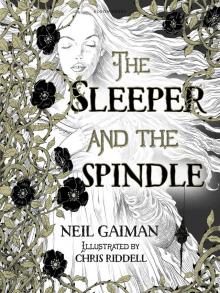 The Sleeper and the Spindle
The Sleeper and the Spindle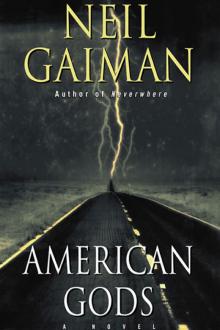 American Gods
American Gods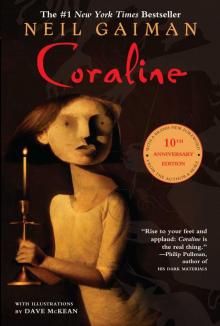 Coraline
Coraline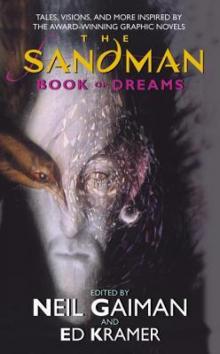 The Sandman: Book of Dreams
The Sandman: Book of Dreams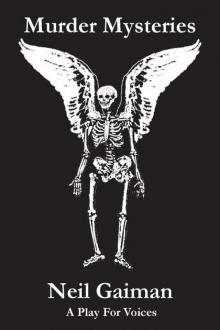 Murder Mysteries
Murder Mysteries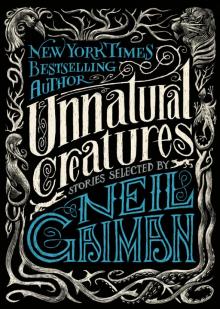 Unnatural Creatures
Unnatural Creatures Eternity's Wheel
Eternity's Wheel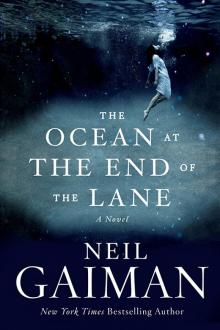 The Ocean at the End of the Lane
The Ocean at the End of the Lane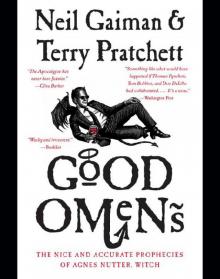 Good Omens
Good Omens Stardust
Stardust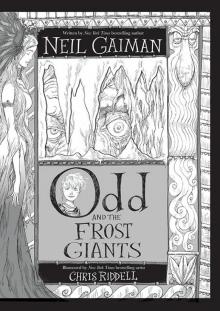 Odd and the Frost Giants
Odd and the Frost Giants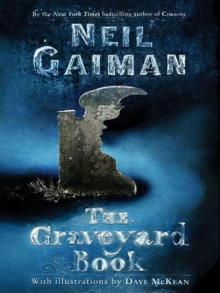 The Graveyard Book
The Graveyard Book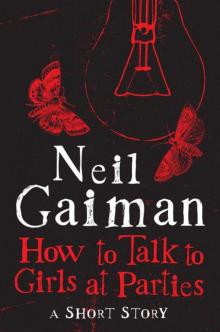 How to Talk to Girls at Parties
How to Talk to Girls at Parties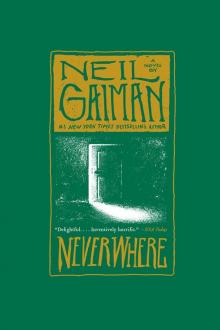 Neverwhere
Neverwhere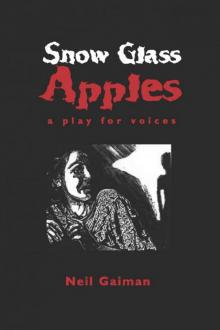 Snow, Glass, Apples
Snow, Glass, Apples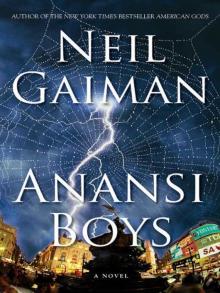 Anansi Boys
Anansi Boys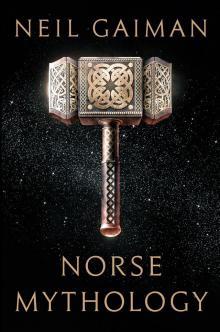 Norse Mythology
Norse Mythology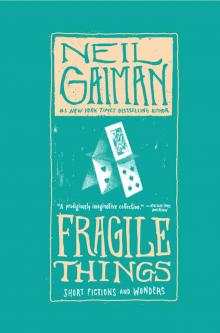 Fragile Things: Short Fictions and Wonders
Fragile Things: Short Fictions and Wonders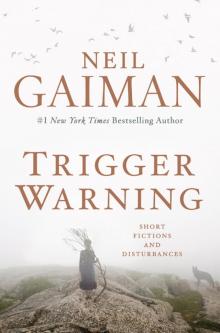 Trigger Warning: Short Fictions and Disturbances
Trigger Warning: Short Fictions and Disturbances InterWorld
InterWorld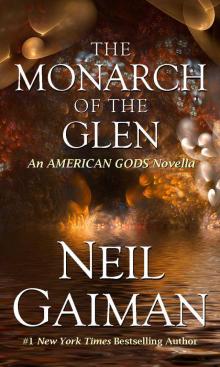 The Monarch of the Glen
The Monarch of the Glen The Neil Gaiman Reader
The Neil Gaiman Reader The Silver Dream
The Silver Dream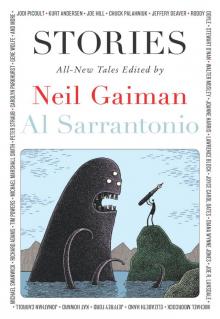 Stories
Stories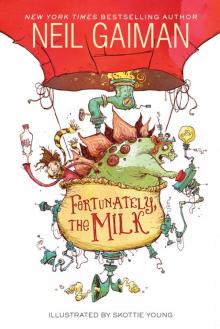 Fortunately, the Milk
Fortunately, the Milk Art Matters
Art Matters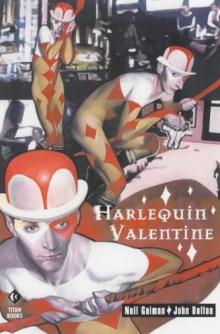 Harlequin Valentine
Harlequin Valentine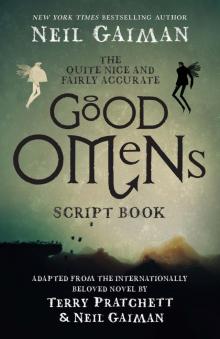 The Quite Nice and Fairly Accurate Good Omens Script Book
The Quite Nice and Fairly Accurate Good Omens Script Book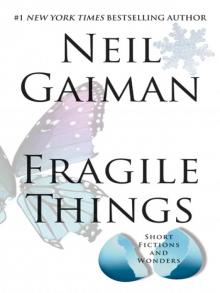 Fragile Things
Fragile Things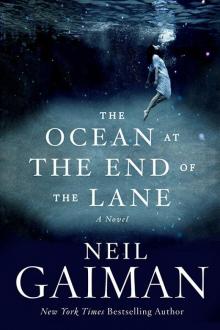 The Ocean at the End of the Lane: A Novel
The Ocean at the End of the Lane: A Novel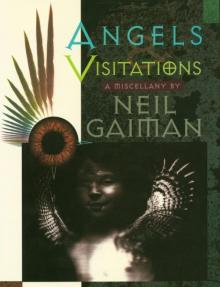 Angels and Visitations
Angels and Visitations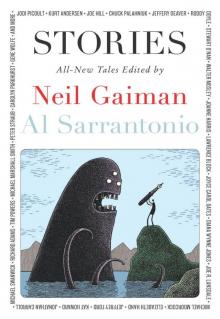 Stories: All-New Tales ngss-1
Stories: All-New Tales ngss-1 Don't Panic
Don't Panic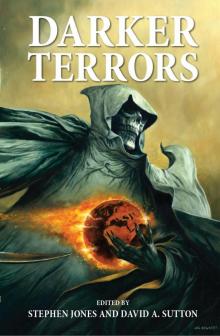 Darker Terrors
Darker Terrors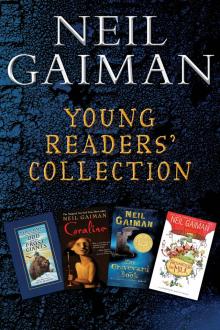 Neil Gaiman Young Readers' Collection
Neil Gaiman Young Readers' Collection A Study In Emerald
A Study In Emerald The Silver Dream: An InterWorld Novel
The Silver Dream: An InterWorld Novel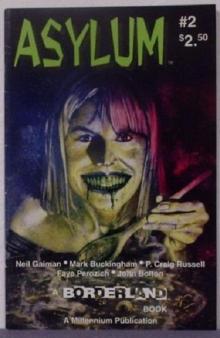 Feeders and Eaters
Feeders and Eaters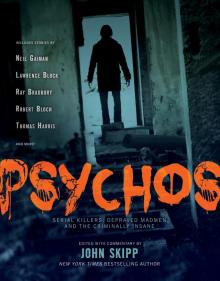 Psychos
Psychos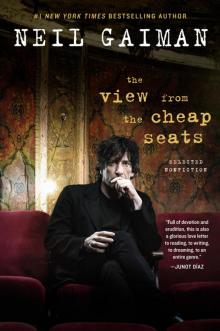 The View from the Cheap Seats
The View from the Cheap Seats Trigger Warning
Trigger Warning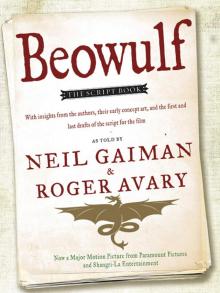 Beowulf
Beowulf Nessun Dove
Nessun Dove Doctor Who: Nothing O'Clock: Eleventh Doctor: 50th Anniversary
Doctor Who: Nothing O'Clock: Eleventh Doctor: 50th Anniversary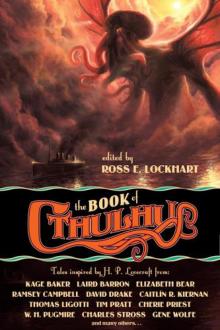 The Book of Cthulhu
The Book of Cthulhu